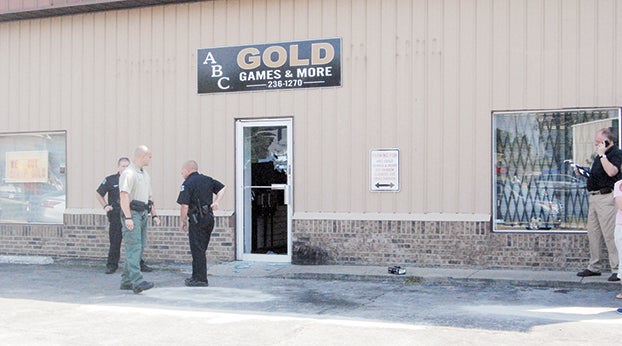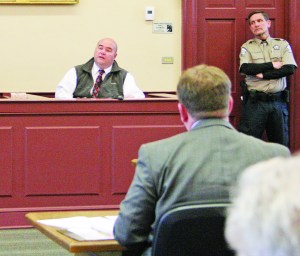‘Every day is Saturday’: Detective Major Peel retires from DPD
Published 9:24 am Tuesday, November 17, 2020

- Authorities gather outside the ABC pawn shop in September of 2013 after three people were killed there. Kevin Peel was the lead detective investigating the case. Peel recently retired from the Danville Police Department after 17 years of service. - File photo
It’s been an interesting career for Detective Major Kevin Peel to say the least.
Notably in his time with the Danville Police Department, he helped investigate a triple shooting, double homicide on High Street in May 2012. That incident happened shortly after Police Chief Tony Gray began as police chief for the department. Peel was also lead detective on the case at ABC Gold, Games and More pawn shop, where gold buyer Daniel Smith and two store operators, Michael and Angela Hockensmith, were murdered in front of the Hockensmiths’ two young children on Sept. 20, 2013.
Peel has also helped investigate cases of all sizes, he said, from petty theft and robbery to murder and sexual assault. The DPD doesn’t have specialized investigators like what would be found in larger cities, he said — officers are trained to tackle all kinds of cases. Prior to starting at the DPD as a police officer in 2003, he was a patrolman in Harrodsburg, where he started his career in 1998. He was first assigned to investigations around 2005 to pick up slack due to staffing issues and went between investigations and patrol for about two years before becoming a detective in 2007. On Nov. 9, 2020, a retirement recognition was held for Peel at a special called city commission meeting.
In the case on High Street in May 2012, Thomas Wayne Hager was the perpetrator who shot and killed two men named Ted Sparks and Mark Snyder. He shot another man, Philip White, who was fleeing the scene. White survived and was still on the scene when police arrived and gave them a description of Hager. Within two hours, Peel said, Hager was in custody with a full confession and a recovered weapon. Within six months, he had pleaded guilty, and the prosecution was over.
Peel said after the case in Danville, Hager was found to be linked to several other killings.
“Nothing would have probably ever convinced me that I would work a case bigger than the Hager case on High Street,” Peel said. “By definition, even though he wasn’t prosecuted, he was basically a serial killer, and to think that we would be dealing with something like that here in Danville was something I never imagined.”
But then the murders took place at ABC Gold, Games and More in September 2013. As the case developed, Peel said it was a much longer investigation and prosecution compared to the one on High Street in 2012 — there were nearly four years between the time of the incident and the perpetrator Kenneth Allen Keith’s guilty plea.
On Sept. 20, 2013, Keith, who was the former owner and operator of the store, came in wearing a disguise, locked the door and shot and killed Smith, who was a gold buyer who bought scrap gold at pawn shops and took it to other resellers, then shot and killed the Hockensmiths in front of their children. A description of Keith and his vehicle were obtained. After that, Peel said DPD was flooded with tips, calls and leads that didn’t really lead anywhere — the department ran blind the first three days of the investigation, he said.
Then on Sept. 24, the department received a call from a pastor in Michigan who had been a friend of Keith’s, who reported he had a conversation with Keith the day of the murders during which Keith laid out a very specific alibi and expressed anger when the pastor had suggested the shop operators were victims. Peel said the pastor recalled Keith saying the shop operators weren’t victims but were evil people who had stolen his business and money. It was Keith’s specific alibi and anger that prompted the pastor to make the call to DPD.
In a short amount of time, Peel said DPD was able to destroy Keith’s alibi, which was that he had been at an appointment at a hospital in Lexington at the time of the murders. DPD was able to confirm he hadn’t had that appointment.

This photo from December 2016 shows Detective Kevin Peel testifying in the pawn shop murder case. – File photo
It was later learned through security cameras that Keith had been circling the block outside the pawn shop on the day of the murders, Peel said. DPD spent about three weeks building a case, and Peel said they knew physical evidence would be difficult to find. During the time building their case and investigating, Peel said DPD got “tremendous” support from the Bureau of Alcohol, Tobacco, Firearms and Explosives, Kentucky State Police and the Somerset Police Department, as Keith at this point had a business in Somerset.
“It was a very, very involved and very collaborative process,” Peel said.
He said the effort paid off because physical evidence was recovered from Keith’s business that tied him to the murders — shell casings discovered to be from the same weapon as the shell casings found in Danville and items that had belonged to Smith — as well as evidence on Keith’s computers that he had been planning the murders for months, at least since January of 2013.
The prosecution of Keith’s case was a long process, Peel said, which led to some public misunderstanding and family members who struggled with how long things were taking, but the length was partially due to Keith’s legal representation changing three times. His first lawyer was murdered. Due to Keith’s representation changing, the process needed to start over again, as investigators needed to go through discovery and submit evidence again each time Keith had a new attorney.
Then in May 2017, Keith pleaded guilty to three counts of murder and received a life sentence without parole. He also pleaded guilty to burglary, theft and robbery cases, Peel said.
After tackling cases like these two and working for the DPD for years, Peel said he made the difficult decision to retire. He said he started a business building guitars in 2010 that’s mostly online and now gets to focus on it with his 16-year-old son.
He said being away from DPD is strange, however. He described the officers he worked with as “outstanding.”
“With so much that’s going on in the world right now, I would stand behind any of them,” he said. “The officers there, they’re good people, and they’re there for the right reasons, and unfortunately that’s not the case everywhere you go.”
Though he said retirement is a good change for him and now “every day is Saturday,” he said it will take a big transition.
“Policing is, of course, it’s a job, but at the same time, it’s more than that, and to not have that anymore — it still hasn’t really sank into me yet, that now I’m the one that calls the police if I need help,” he said. “I’m not the one that gets called, and it’s going to take some getting used to.”






